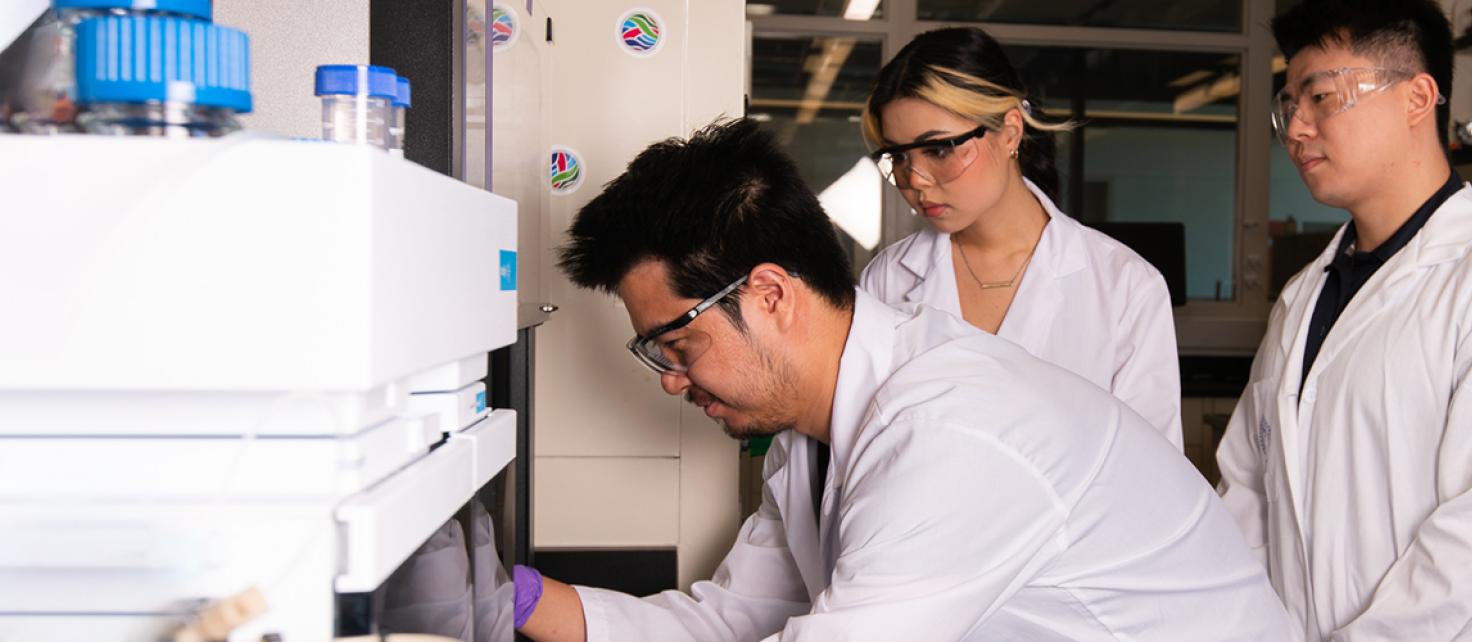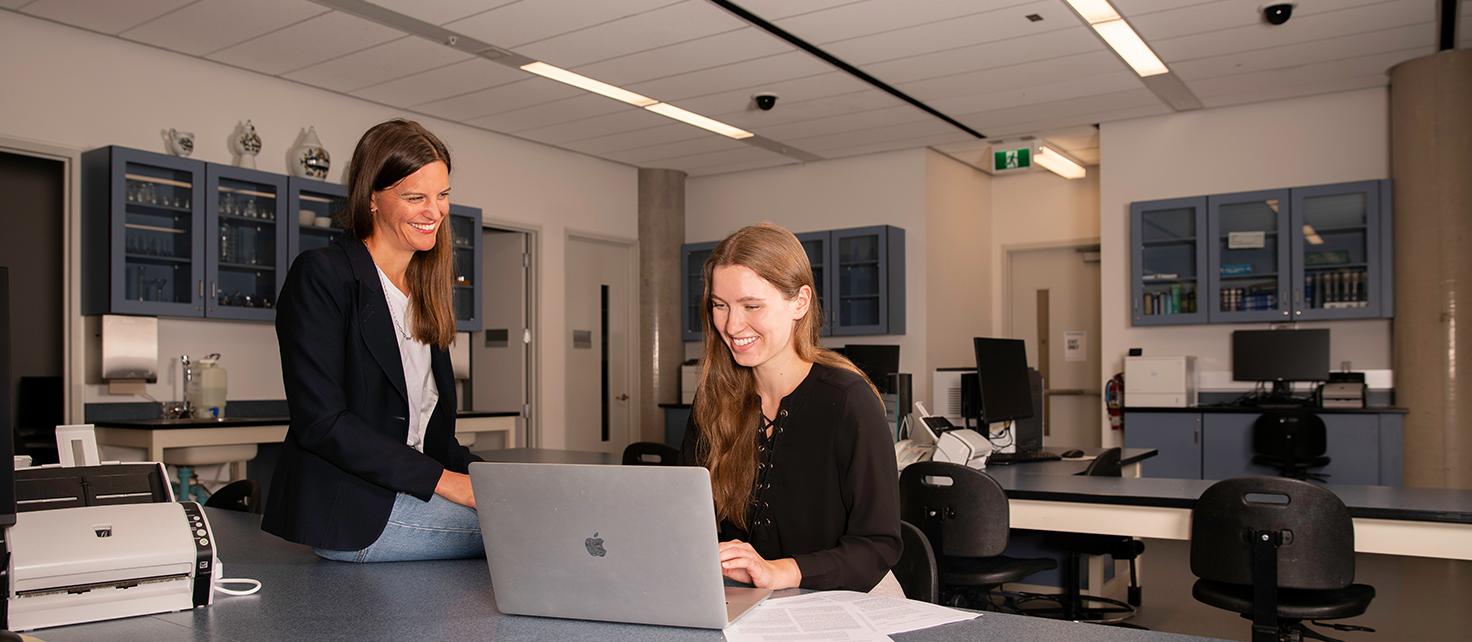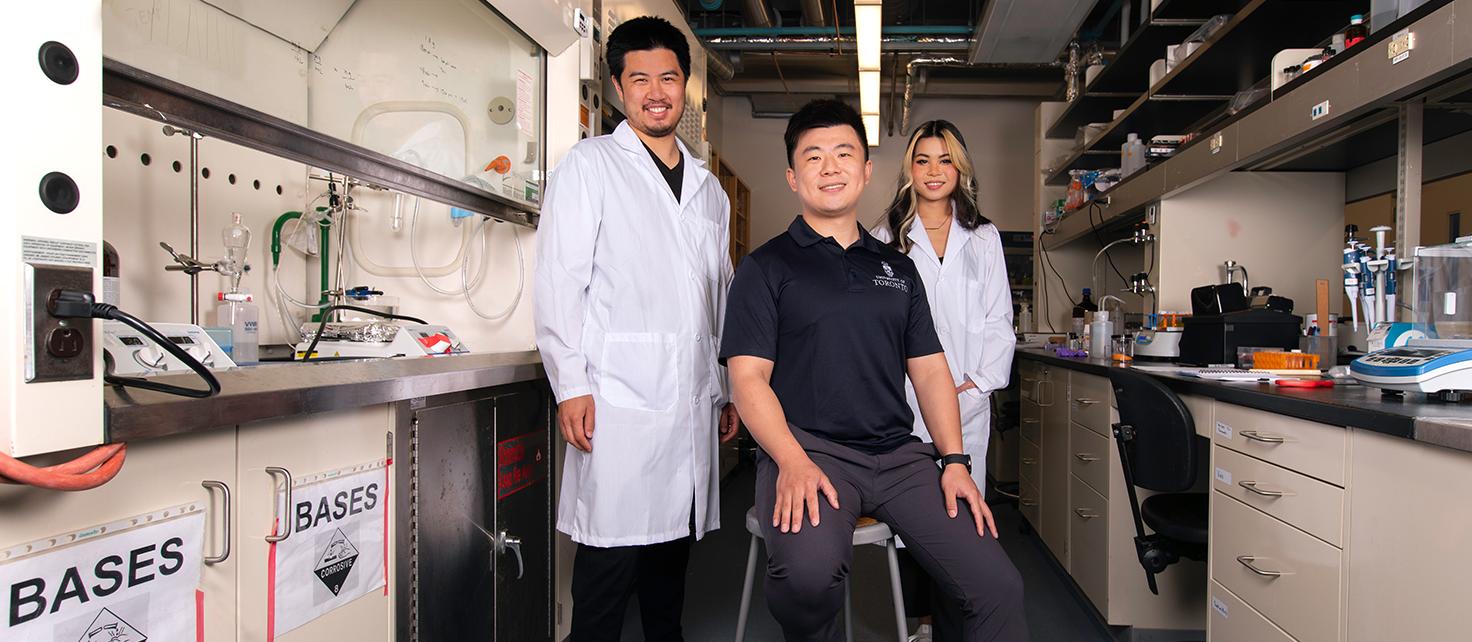Leslie Dan Faculty of Pharmacy experts are discovering new drugs and building pharmacy profession to provide better patient care
Pharmacy teams provide care for patients across the spectrum of health conditions and circumstances. And pharmacy shelves are stocked with thousands of different drugs that can save lives, help patients manage chronic conditions, and alleviate symptoms of illness. Health Canada has approved roughly 14,000 drugs, each one having been uniquely discovered and extensively tested, with pharmacists able to take responsibility for assessing effectiveness, safety and use and educate their patients on these drugs to receive the most benefit. And researchers continue to look for ways to improve existing treatments and discover new drugs.
Researchers and pharmacists at the Leslie Dan Faculty of Pharmacy are leaders in every step of this cycle. From the earliest stages of drug development to real-world medication use, they are contributing to better care for patients and improving health outcomes.
“In my experience, research at the Leslie Dan Faculty of Pharmacy tends to focus on ideas that can eventually be translated to the clinic,” says Carolyn Cummins, associate professor at the Leslie Dan Faculty of Pharmacy and director of the Pharmaceutical Sciences program.
We have researchers with so many different areas of expertise all under one roof, and this is a huge advantage in moving research forward.”
Pharmaceutical Sciences Program Director and Professor Carolyn Cummins
Finding the target
Developing a new drug starts with finding a target – a molecule whose activity can be changed to affect a disease or condition. Finding a new drug target requires a strong understanding of molecular biology and molecules’ activities.
Carolyn Cummins is studying the biology of cells and molecules to look for new drug targets. Her team studies nuclear receptors and their role in metabolic disease, particularly diabetes, to look for potential molecular targets for new drugs to treat these conditions.
“I find it very exciting to discover new biology,” says Cummins. “Observations that don’t fit with anticipated results or the current paradigm often take me in new directions. “The pharmaceutical industry is excellent at developing new drugs, but they need well-validated targets to know where they should invest in drug development. My lab works on understanding how different proteins contribute to metabolic disease and validating whether these proteins can serve as drug targets.”
A major focus of Cummins’ research is finding drug targets to prevent glucocorticoid-induced diabetes. Glucocorticoids are often taken to treat chronic inflammation, but these drugs act on a cell receptor in the liver that also increases glucose production and increases the risk of developing diabetes. Her team studies whether the cell receptor liver X receptor (LXR) could be targeted with drugs to decrease the risk of glucocorticoid-induced diabetes and other negative side effects of glucocorticoid therapies.
In another line of research in collaboration with colleagues in Brazil, her team is examining whether a compound found in a by-product of Brazilian cashew shells can activate another nuclear receptor involved in metabolism called PPAR. While this research is still in early stages, they hope that this compound could be used as a drug for conditions such as hyperlipidemia and insulin resistance at a much lower cost than current therapies.
“A lot of the foundational work to find new drug targets happens in academia,” says Cummins. “This fundamental science has to happen first.”
A formula for success
Once a drug has been developed to hit its molecular target, researchers need to find a way to deliver the drug where it needs to go. After all, a drug could be highly effective against its target in a petri dish, but if it can’t reach it’s target in the body, it’s essentially useless.
Finding the right delivery system or formulation – whether it’s an oral capsule, an IV-delivered chemotherapy drug, a skin patch, or any of the other potential delivery methods – is a key part of a drug’s life cycle.
Ping Lee, professor at the Leslie Dan Faculty of Pharmacy, leads research to tackle the challenge of low bioavailability of oral medications that are poorly water soluble, which is the majority of new chemical entities emerging from drug discovery.
Oral formulations are preferred for most drugs but developing a formulation that ensures a drug can reach the bloodstream and its target after a patient swallows a pill is challenging. It is especially difficult for drugs that have a crystal structure that limits its solubility and absorption into the blood.
“Our research brings new insights into how drugs are released from amorphous solid dispersions, which is an important strategy to enhance the solubility and bioavailability of poorly soluble drugs and provides guidelines for the design of such delivery systems,” says Lee.
Lee’s team uses physicochemical techniques to convert a poorly soluble drug crystal into an amorphous state and stabilizing it in a unique polymer matrix that forms the “amorphous solid dispersion” or ASD, which is more soluble and allows the drug to be absorbed and reach the bloodstream more easily.
“It’s the scientific and technical challenge that keeps us interested. We’re trying to solve a real-world problem that could be beneficial to patients”
They have developed approaches using ASDs that have improved the delivery and absorption of several drugs that were nearly abandoned due to their poor solubility. They have also investigated drug release and drug crystallization in ASDs during storage, both affecting their stability and enhancement in bioavailability.
“It’s the scientific and technical challenges that keep us interested. We’re trying to solve a real-world problem that could be beneficial to patients,” says Lee.
Professor Lisa McCarthy (left) and Pharmacist Ida-Maisie Famiyeh
Optimizing patient medications
After a drug’s approval, a whole new set of questions may emerge about its safety and effectiveness in real-world settings, which may be different than the optimal conditions of a lab or trial.
For one, many patients aren’t taking a single drug for a single condition. In fact, 40 per cent of adults over age 65 are prescribed five or more drugs, an issue known as polypharmacy. Pharmacists and other health care professionals are often focused on getting a patient started on the right drug for their condition, but perhaps just as important is assessing when a patient should stop taking a medication.
Lisa McCarthy, associate professor and clinician scientist at the Leslie Dan Faculty of Pharmacy, focuses her research on medication management and helping patients get the most benefit from their medications. A significant part of her research looks at deprescribing – a planned and supervised process to help patients stop taking medications that are no longer benefiting them.
“We have powerful medications and access to lots of medication options. The research that I lead focuses on how we help people get the most benefit from their medications and make sure that they’re taking what they need, no less and no more, and for the right amount of time,” says McCarthy.
The more medications a patient takes, the greater the risk of drug interactions or adverse events, but those drugs could also be critical to a patient’s care. As medication experts, pharmacists play an important role in helping other health care professionals and patients understand the changing risk-benefit ratio of each drug as their health changes over time.
“There is a momentum and growing awareness of this problem now,” says McCarthy. “There is still a lot of work to do to address this problem, but we can find ways to help pharmacists and prescribers support patients all the way through the medication continuum, knowing that a patient’s medication needs will change.”
“I keep doing this work because I’ve personally seen the benefits for so many people."
McCarthy’s research work has been incorporated in national and global deprescribing guidelines that help clinicians identify patients who would benefit from deprescribing and what approach would be best for them.
McCarthy says that deprescribing medication that is no longer beneficial to patients, and may even be harmful, can be life-changing for patients.
“I’ve seen people at risk of falls become steadier on their feet and able to regain some independence. I’ve seen the lives of people who were not able to make their own care decisions or do activities they once valued essentially transformed when able to think more clearly,” says McCarthy. “I keep doing this work because I’ve personally seen the benefits for so many people."
Assistant Professor Naomi Steenhof (left) and fourth year PharmD student Viktoriya Bardel
Training experts in a changing field
The pharmacy profession has changed significantly in recent years: a greater number and more complex medications are being offered, new drugs are being approved at an impressive pace, and the scope of practice has expanded, with pharmacists providing vaccinations and other public health services.
For even seasoned pharmacists, the amount of information they need to know can be overwhelming. Teaching and training new pharmacists in this environment is a significant task.
Naomi Steenhof, assistant professor at the Leslie Dan Faculty of Pharmacy, leads research focused on pharmacy education and has studied how pharmacy students and practising pharmacists learn. She investigates the importance and applicability of concepts known as productive struggle and adaptive expertise in training future health care providers.
Adaptive expertise is a conceptual framework that develops experts to be creative problem-solvers and apply their knowledge to new situations and contexts, instead of expecting them to learn and remember huge amounts of information. The adaptive expertise approach allows students to experience struggle as a way to encourage learning, understand not just what they are doing but why, and exploring “what if” scenarios to uncover important concepts. It’s an approach that recognizes and encourages the diverse experiences of learners.
“Our education needs to help our students become more adaptive, because in 30 years, who knows what types of medications and therapies will be out there and what our roles will be”
“All of our learners, whether novices or through continuing professional development, come to the table with a vast amount of knowledge and personal experience. As educators, we can recognize and value the knowledge and experiences that they bring,” says Steenhof. “Sometimes we feel like we have to separate our personal experiences from professional learning, but adaptive expertise allows us to value that experience and bring it to the forefront.”
Viktoriya Bardal, a fourth-year Doctor of Pharmacy (PharmD) student at the Leslie Dan Faculty of Pharmacy, says courses in the PharmD program required her use more problem-solving skills than during her undergraduate degree in science. In some classes, she and her classmates would be presented with patient cases to make recommendations about medications, adverse reactions, and other important details with minimal information.
“It was challenging and more work to go through the process of finding this information, but our instructors were teaching us how to apply what we’ve learned to find the information we need,” says Bardal. “In our future practices, we won’t always be presented with all the information we may need. We need to learn how to learn so that we can do it in the future."
Steenhof agrees that the adaptive expertise approach is particularly important to prepare future pharmacists in an ever-changing profession.
“Our education needs to help our students become more adaptive, because in 30 years, who knows what types of medications and therapies will be out there and what our roles will be,” says Steenhof. “We want to make sure that we’re preparing our students to serve society in a way that’s going to be useful as our context continues to shift and change.”
Assistant Professor Bowen Li (centre) with graduate students Kevin Wang (left) and Tiana Young
New horizons in drug discovery
One way that the pharmacy profession may change in the future is in the types of drugs available, as new classes of drugs are being discovered and approved. For example, in the last two years, mRNA-based therapies have become the focus of intense research interest after being successfully used in Pfizer-BioNTech and Moderna’s COVID-19 vaccines.
Bowen Li, assistant professor at the Leslie Dan Faculty of Pharmacy, says that vaccines are just the beginning of what mRNA technology could be used for.
“The mRNA technology is still very young, and we haven’t reached the full potential of mRNA therapeutics yet,” says Li. “This platform could be used to address many different diseases including cancer and autoimmune diseases, as well as techniques for vaccines and gene editing. We’re looking forward to the benefits that mRNA technology can bring to us in the future.”
Li’s cutting-edge research program is developing new delivery platforms for mRNA vaccines and therapies. While mRNA therapies offer significant advantages over conventional drugs, particularly the speed at which they can be developed and their relatively low costs, delivering the mRNA to its target tissue is currently the biggest barrier to broader use.
For example, the current mRNA vaccines are only delivered intramuscularly to reach the blood; while this application produces a protective immune response, a vaccine that could be delivered directly to the target organ (for example, in the case of COVID-19, the nose or mouth) would provide better protection at a lower dose. This is particularly important if mRNA is to be used to treat various forms of cancer and other diseases.
Li’s team is developing formulations to deliver mRNA drugs directly to the relevant organs. They use advanced automated techniques that allow them to quickly synthesize thousands of different lipid nanoparticles, which are used to deliver mRNA, and find the best candidates to study further.
“Our focus is to provide a toolbox of lipid nanoparticle formulations for mRNA so that we can facilitate wider applications for other diseases,” he says.
Tiana Young will be starting her master’s degree in Pharmaceutical Sciences this fall in Li’s lab. Having just completed a degree in pharmaceutical chemistry at U of T with a thesis projects focused on immunology and bionanotechnology, she is looking forward to working in a lab that is at the forefront of the research field.
“I really wanted to join a lab where I could apply what I learned through pharmaceutical chemistry related to the drug industry but also develop novel delivery systems and investigate how the body interacts with new formulations. This research is really at the crosshairs of all the things I was interested in,” says Young. “Dr. Li’s lab is at the forefront of new drug development in a very relevant field of mRNA vaccines, and he has a lot of new ideas and is very open-minded to new technology and developments. It’s very exciting to be a student in a lab like this.”
“We can bridge the gap between the fundamental scientists and clinicians to solve clinical problems and bring people together to do highly impactful research.”
Li says that being based at the Leslie Dan Faculty of Pharmacy provides opportunities for collaborations that lead to innovative solutions to highly relevant clinical problems.
“Our faculty is interdisciplinary, and our lab is kind of in between fundamental scientists and clinical scientists,” says Li. “We can bridge the gap between the fundamental scientists and clinicians to solve clinical problems and bring people together to do highly impactful research.”
More News
Image

Pharmacy alum sees change in acceptance of Indigenous cultures in health care
During Deborah Emery’s 40-year pharmacy career, she provided care in Sioux Lookout, Thunder Bay and Manitoulin Island.
Read More
Image

Grad to Watch: Jackie Fule Liu’s research focuses on better outcomes for diabetes patients
A recent PhD graduate, Jackie Fule Liu combines hands-on skill and big-picture thinking to help tackle diabetes care challenges.
Read More
Image

U of T community members recognized with Order of Canada
Congratulations to Dean Emeritus and Professor K. Wayne Hindmarsh on his appointment.
Read More




